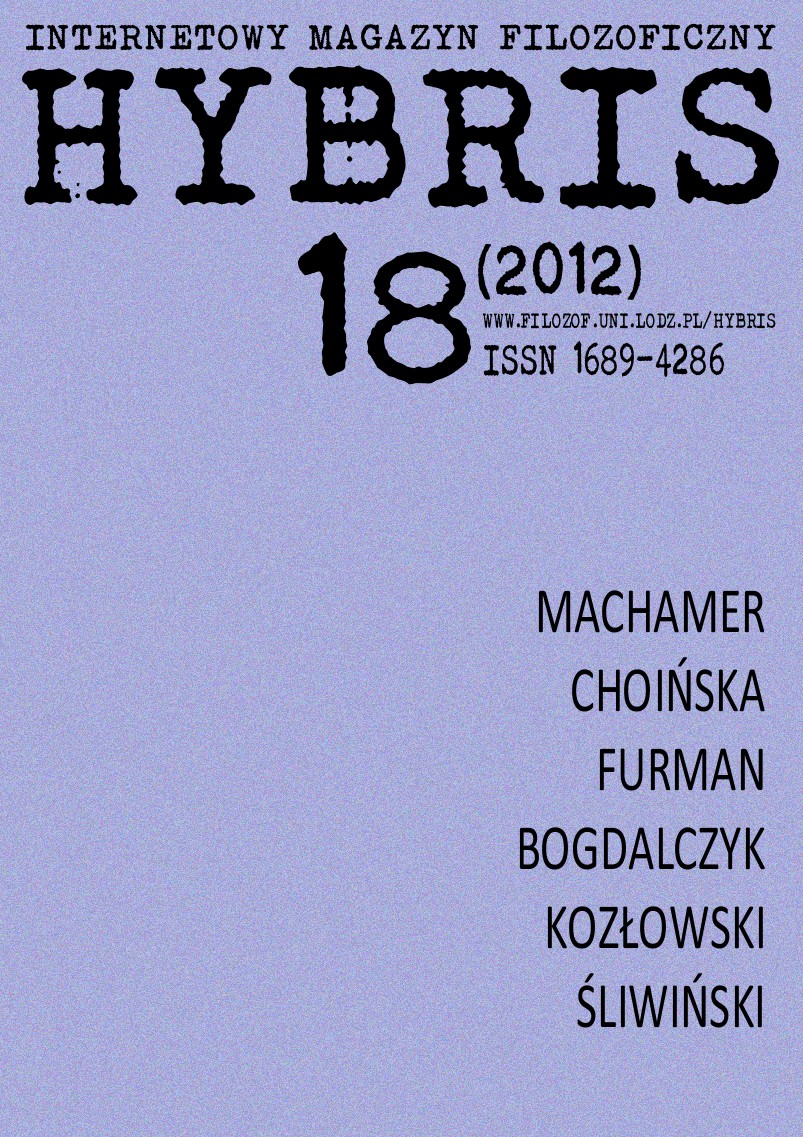Wolność Boga w tworzeniu obrazu wiedzy ludzkiej a wolność człowieka do jej przyjmowania jako zagadnienie w filozofii R. Descartes’a
DOI:
https://doi.org/10.18778/1689-4286.18.06Abstrakt
The topic of freedom in Descartes’ philosophy is usually being connected with human freedom. It is understood in the traditional perspective of distinguishing right from wrong and truth from false. This aspect is, in my opinion, sufficiently explained. The same applies to Descartes’ ethics, connections of which with Antiquity were often mentioned. In the paper I bring up quite different issue. It rests on the question what it means that God creates the truth and what consequences it has for human validity (and necessity) of recognizing and receiving it, what is its status and, finally, how it reconfigures the relation between God and the man.
Bibliografia
Alquié, F. ( 1950), La decouverte metaphysique de l’homme, Paris. [?]
Zobacz w Google Scholar
Alquié, F. (1989), Kartezjusz, tłum. S. Cichowicz, Warszawa. [?]
Zobacz w Google Scholar
Descartes, R. (1897–1913), Oeuvres de Descartes, par: Ch. Adam, P. Tannery, t. 1., Paris.
Zobacz w Google Scholar
DOI: https://doi.org/10.5962/bhl.title.39750
Descartes, R. (1930), Discours de la methode, Texte et Commentaire par E. Gilson, Paris.
Zobacz w Google Scholar
Descartes, R. (1958), Medytacje o pierwszej filozofii wraz z zarzutami uczonych mężów i odpowiedziami autora, oraz Rozmowa z Burmanem, tłum. Maria i Kazimierz Ajdukiewicz, t. 2, Warszawa.
Zobacz w Google Scholar
Descartes, R. (1981), Rozprawa o metodzie właściwego kierowania rozumem i poszukiwania prawdy w naukach, tłum. W. Wojciechowska, Warszawa.
Zobacz w Google Scholar
Descartes, R. (1995), Listy do Księżniczki Elżbiety, tłum. J. Kopania, Warszawa.
Zobacz w Google Scholar
Descartes, R. (1996), Listy do Regiusa, Uwagi o pewnym pisemku, tłum. J. Kopania, Warszawa. .
Zobacz w Google Scholar
Descartes, R. (1998), Listy do Voetiusa, tłum. J. Usakiewicz, Warszawa.,
Zobacz w Google Scholar
Descartes, R. (2005), Zarzuty i odpowiedzi późniejsze, Korespondencja z Hyperaspistesem, Arnauldem i Morem, przeł. J. Kopania, Kęty.
Zobacz w Google Scholar
Drozdowicz, Z. (1980), Kartezjusz a współczesność, Poznań.
Zobacz w Google Scholar
Drozdowicz, Z. (1987), Intelektualizm i naturalizm w filozofii francuskiej, Poznań.
Zobacz w Google Scholar
Drozdowicz, Z. (2008), Bóg w filozofii Kartezjusza, [w:] Oblicza filozofii XVII wieku, Lublin.
Zobacz w Google Scholar
Drozdowicz, Z. (2011), Descartes i Pascal — dwaj antagoniści, [w:] Filozofia XVII wieku, Toruń.
Zobacz w Google Scholar
Geuroult, M. (1953), Descartes selon l’ordre des raisons, t. 1, Paris.
Zobacz w Google Scholar
Guenancia, P. (1986), Descartes, Paris.
Zobacz w Google Scholar
Gut, P. (2008), Jak możliwa jest wolność?, [w:] Oblicza filozofii XVII wieku, Lublin.
Zobacz w Google Scholar
Hanby, M. (2003), Augustine and modernity, New York.
Zobacz w Google Scholar
DOI: https://doi.org/10.4324/9780203451854
Janowski, Z. (1998), Teodycea kartezjańska, Kraków.
Zobacz w Google Scholar
Jaquet, Ch., Pavlovits, T. (2004), Les significations du „corps” dans la philosophie clasique, Paris.
Zobacz w Google Scholar
Kopania J. (2009), Szkice kartezjańskie, Kraków.
Zobacz w Google Scholar
Kopania, J. (1988), Funkcje poznawcze Descartes’a teorii idei, Białystok.
Zobacz w Google Scholar
Kopania, J. (2003), Boski sen o stworzeniu świata, Białystok.
Zobacz w Google Scholar
Malebranche, N. de (2011), Poszukiwanie prawdy, tłum. M. Frankiewicz, Warszawa..
Zobacz w Google Scholar
Moreau, D. (2004), Malebranche, Paris.
Zobacz w Google Scholar
Rodis-Levis, G. (2010), Descartes, Paris.
Zobacz w Google Scholar
Schouls, P. A. (1989), Descartes and the Enlightenment, Edinburgh.
Zobacz w Google Scholar
Watson, R. (2007), Cogito ergo sum, The life of René Descartes, New Hampshire.
Zobacz w Google Scholar
Pobrania
Opublikowane
Jak cytować
Numer
Dział
Licencja

Utwór dostępny jest na licencji Creative Commons Uznanie autorstwa – Użycie niekomercyjne – Bez utworów zależnych 4.0 Międzynarodowe.






